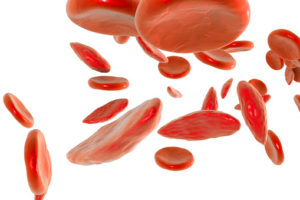RH antigens are encoded by two highly polymorphic genes, RHD and RHCE. Homologous recombination and novel polymorphism have resulted in over 50 RH antigens at the serologic level, and genetic diversity differs by ethnic groups. Approximately 85% of African-American patients with sickle cell disease (SCD) carry at least one RH allele, which is uncommon in the blood donor pool that is predominately composed of Caucasians. Although most institutions serologically match patients with SCD for common RH antigens (C, E, and K), high rates of alloantibody formation continues to occur following RBC transfusions in this patient population. Chou et al recently genotyped the RH genes for 587 African-American blood donors and 857 patients with SCD, and found similar rates of RH allele frequencies. However, in order to match RH genotypes and reduce rates of alloimmunization after RBC transfusions in patients with SCD, over twice the number of African-American donors are needed when compared to standard serologic matching. Further challenges for the implementation of RH genotyping in patients with SCD include more cost-effective genotyping strategies and a data system to store and share genotyping data across institutions.
References:

